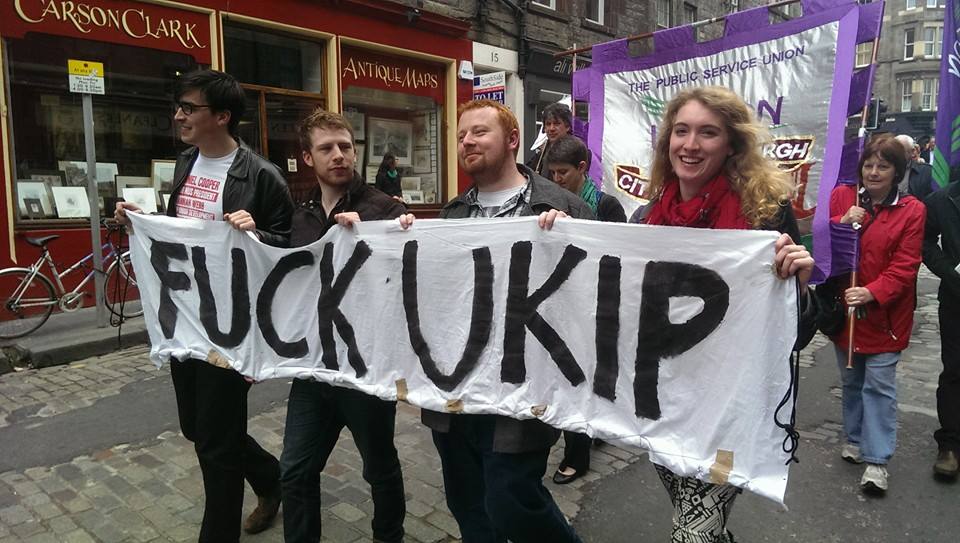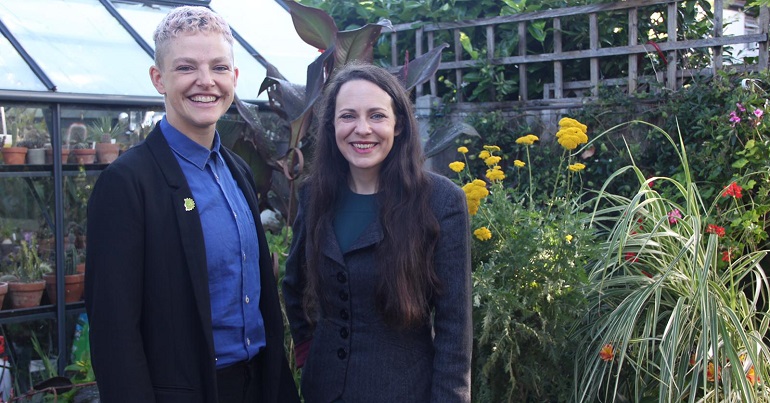Farage, Greens and the culture war

“I’m not particularly bothered by it, but I know a lot of people do feel very uncomfortable… I mean, look, it’s just a matter of common sense, isn’t it”.
That could be the UKIP slogan for 2015. Nigel Farage could have been talking about meeting immigrants at a party. He could have been discussing walking past a group of ‘foreigners’ in the street. It could have been anything really – anything that makes some people uncomfortable. It was, in fact, mothers breastfeeding in public he was talking about. “I’m not particularly bothered by it, but I know a lot of people do feel very uncomfortable”.
People sometimes wonder how UKIP do so well despite having very few real policies. And this, very much, is the answer. I think there probably are a certain percentage of people in the country who feel a little uncomfortable when a mother near them starts to breastfeed. It’s probably a reasonably high percentage.
It’s just, in a functional society, we have to weigh one discomfort against another: that of the person who doesn’t like seeing a mother breastfeed against that of the hungry baby; the desire of some that women with infants are kept out of sight, are forced back into their homes, and the desire of mothers with young children to play an active part in our community. If we’re going to become a less sexist society, then, yes, some people who were comfortable with the world as it was will have to put up with a little unease for a while.
But here’s the thing. As long as some people are uncomfortable, there will be politicians like Nigel Farage willing to play on that discomfort. Rather than telling them they’ll be OK, and enthusing them to push their unease to the back of their minds, they will tell them that they are right to be uncomfortable, that their discomfort is natural, that ‘it’s just common sense, isn’t it?’.
And it’s by doing this that Farage has gained so much support. Because, as the leader of a minority party, he understands that his job is not to appeal to the majority of people. In modern politics, no one party can expect to even approach winning over more than half of the population. To be phenomenally successful, Farage only needs to win over around 25% people of those who actually vote. That’s unlikely to be more than 17% of the adult population. In doing so, he can get away with pretty much everyone else utterly hating him.
What we’ve seen today is Farage doing this brilliantly. I suspect the majority of people don’t agree with his comments on breastfeeding – afterall, a huge portion of women will at some point in their lives breastfeed, and a huge portion of men will have a partner who has, is, or will. But he expressed the views of a minority – a view which most of that minority previously felt (rightly) it was impolite to express in public, but a view they held nonetheless. Already, that’s winning him votes from some people in that 20-25% that he’s aiming to secure.
Secondly, his comments provoked the left into slamming him – which it is important to do, so that breastfeeding mothers are clear that this isn’t an opinion held by most in society, that they should feel welcome to feed wherever they want to. But the response means that suddenly, once more, he’s at the centre of a controversy. And controversy is news: the opposite of being controversial is being ignored. And there he is, back on the front pages of the papers. For a minority party, that’s always a huge bonus, and adds up to more votes.
Thirdly, the response itself allows Farage to play on a classic trope of the “old-fart-right” he seeks to represent: that “you aren’t allowed to say things like this anymore”. After the media bangs on for years about little else but immigration, people still seem to think that some ‘elite’ is prohibiting them from talking about it. Likewise, I think we can expect lots of people who agree with Farage here to feel the same. And this is important for him too. Because it allows these people – many of whom are reasonably wealthy, old, white and male, to feel like they are being oppressed, like their voices are being shut down. And it’s at that point that they are more likely to turn away from society, and from the older parties which they have voted for in the past, and instead switch over to UKIP.
Of course, none of this is new. This has been Farage’s modus operandi for a long time now. And he’s very good at it.
He is, in fact, so good at it, that I think there is a lot that the left in general, and Greens in particular, could learn from it. Because what I’ve outlined above (as Peter McColl did on Bright Green four years ago) is how Farage is doing well because he’s dug himself a trench and raised a flag in the emerging British culture war.
There’s a vital role for Greens over the coming years in digging another trench, raising another flag, and fighting back. Firstly, this is important because progress against sexism, racism, homophobia, classism, disablism, transphobia and other forms of oppression aren’t inevitable. As the likes of UKIP attack, unless anyone organises those who stand against them, we’ll start to slip backwards.
Secondly, it’s also a path to success. Greens don’t need to aim to win over a majority of people. Like UKIP, if we got 25% we’d be delighted (particularly assuming some of them cluster geographically, allowing victory in first-past-the-post seats). Like UKIP, one important way to win over those people is to be willing to say things that they think, but where they feel like they are in a minority, things which sometimes aren’t otherwise seen as acceptable on the political stage.
Like UKIP, dragging the debate in our direction will require provoking some controversy, saying things that the right will attack us for. Otherwise, no one will notice. But when they do attack, we can expect new comrades to rush to our aid, to fight in our corner because they see us fighting theirs. We need to unashamedly raise a flag, not sneak our policies out and hope no one notices that they imply radical changes which will, for many, upset an all-too-comfy apple cart.
Greens have started doing this – Natalie Bennett speaking out against immigrant bashing is one case in point. Having spoken to lots of new party members about why they joined, my impression is that this has contributed to the famous “Green Surge”. But we need more, please.
Richard Seymore writes in the Guardian today that the problem with the Green Party is that we’re too nice. He’s right. It’s time to pick some fights.




“There’s a vital role for Greens over the coming years in digging another trench, raising another flag, and fighting back. Firstly, this is important because progress against sexism, racism, homophobia, classism, disablism, transphobia and other forms of oppression aren’t inevitable.”
I recently joined the Scottish Greens to help promote the de-centralist, self-sufficiency, peace and nature conservation ideas that brought the Greens into being in the first place (I’m 60). That’s the distinctive flag I would like to see raised. The list you give above could belong to any party. Maybe most Conservatives would baulk at “classism” (if their is such an -ism) but some one-nation meritocratic ones would not. The central green principle of “living within our means” is quite capable of attracting thoughtful Tory and Labour voters but those totemic isms you claim we stand out for are more likely to obscure that primary agenda than promote it. Trying to be more “left” and “trendy” than anybody else is not a plan for serious change in the way things are done in a UK facing crisis on all fronts.
“There’s a vital role for Greens over the coming years in digging another trench, raising another flag, and fighting back. Firstly, this is important because progress against sexism, racism, homophobia, classism, disablism, transphobia and other forms of oppression aren’t inevitable.”
I recently joined the Scottish Greens to help promote the de-centralist, self-sufficiency, peace and nature conservation ideas that brought the Greens into being in the first place (I’m 60). That’s the distinctive flag I would like to see raised. The list you give above could belong to any party. Maybe most Conservatives would baulk at “classism” (if their is such an -ism) but some one-nation meritocratic ones don’t. The central “living within our means” principle is quite capable of attracting thoughtful Tory and Labour voters but those totemic isms you claim we stand out for are more likely to obscure the primary agenda than promote it. Trying to be more “left” and “trendy” than anybody else is not a plan for serious change in the way things are done in a UK facing crisis on all fronts.